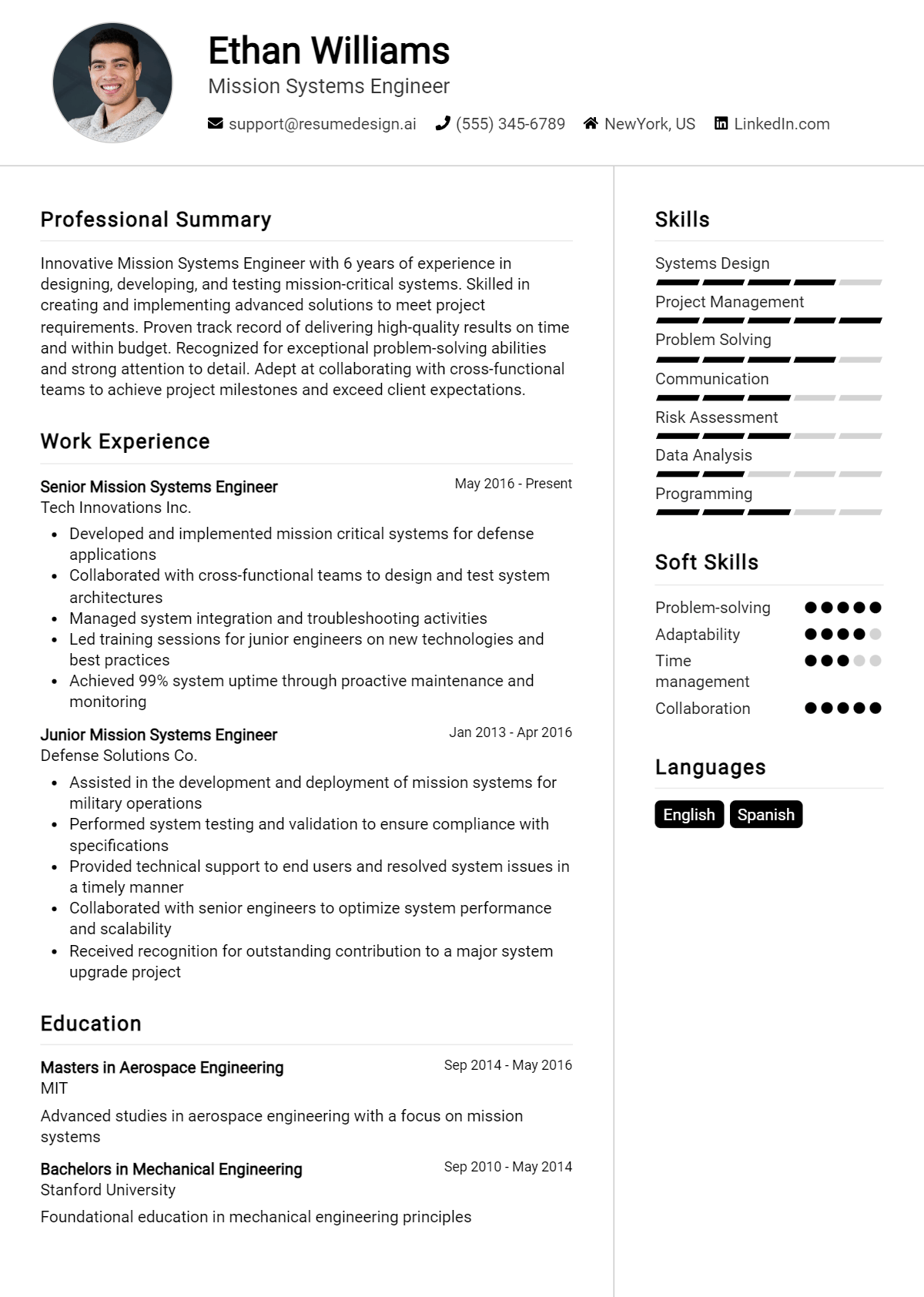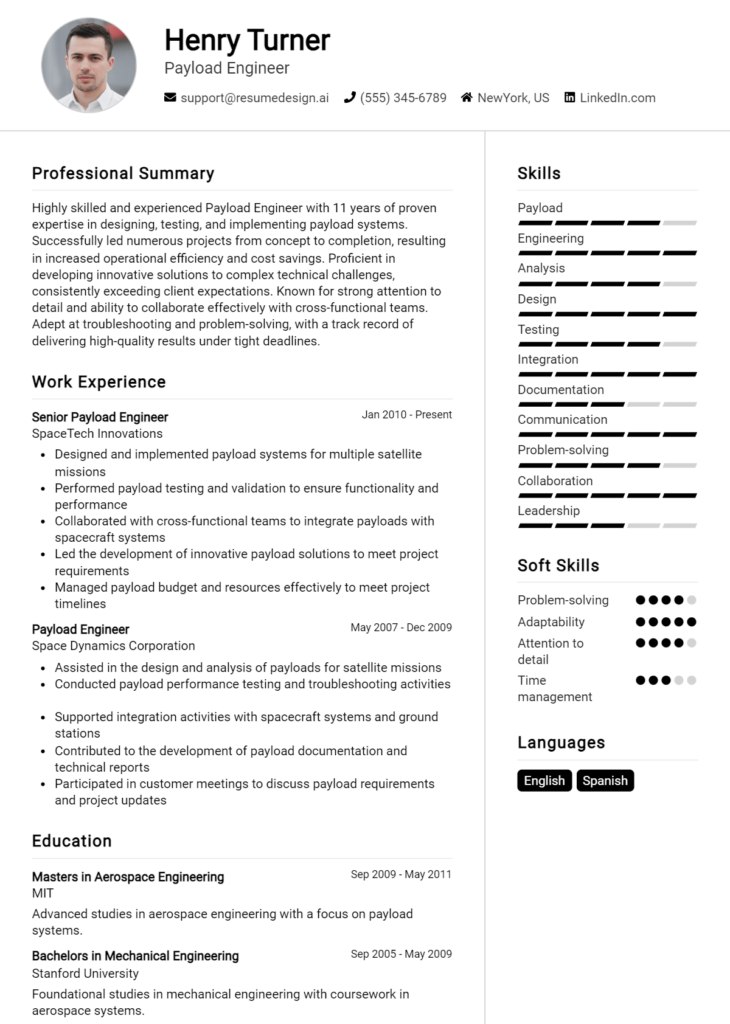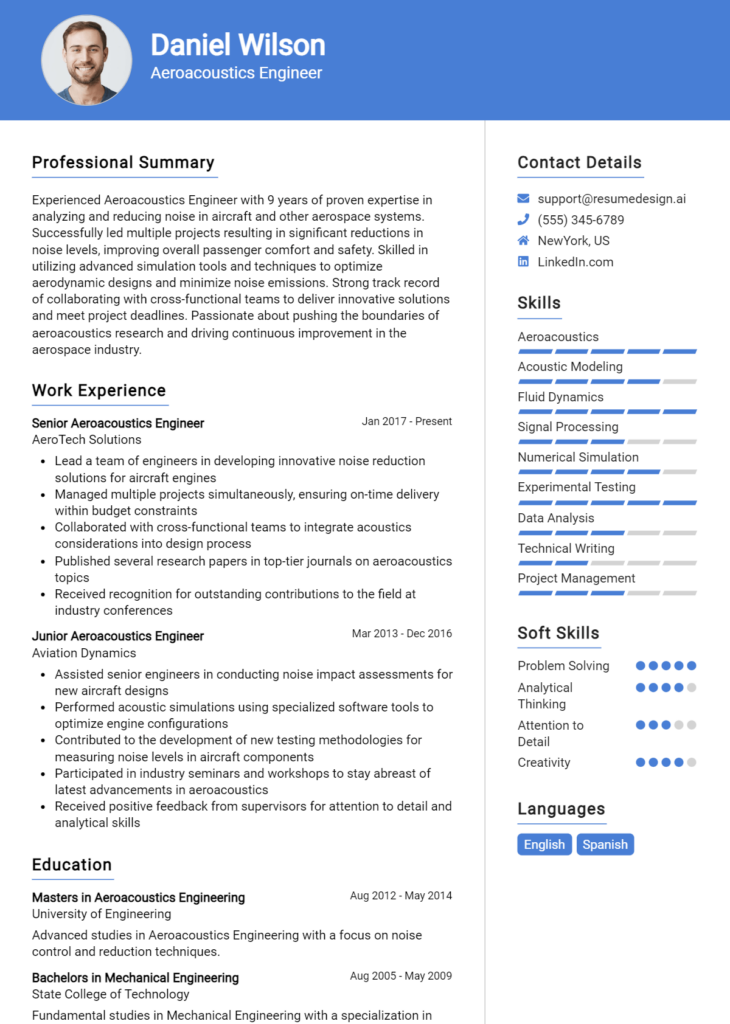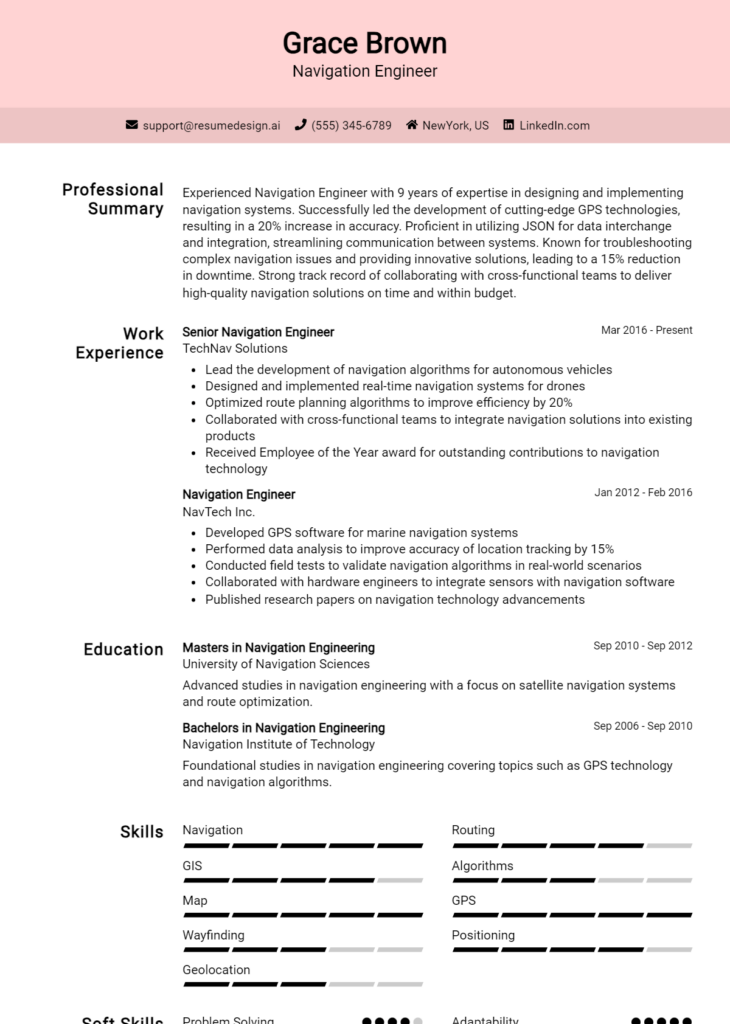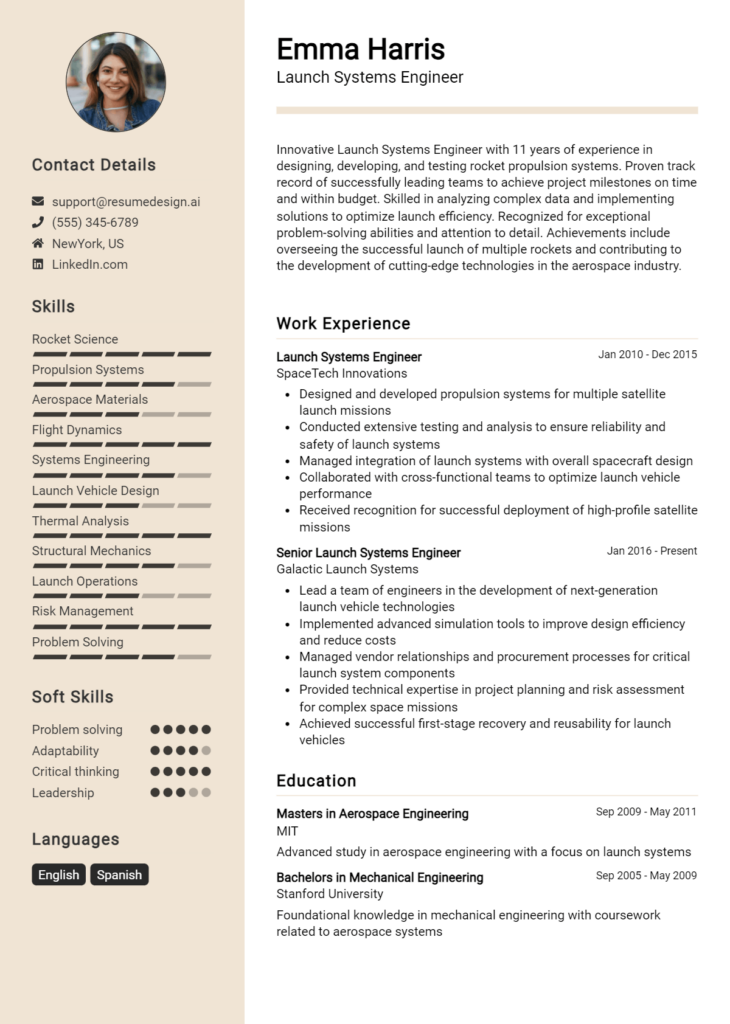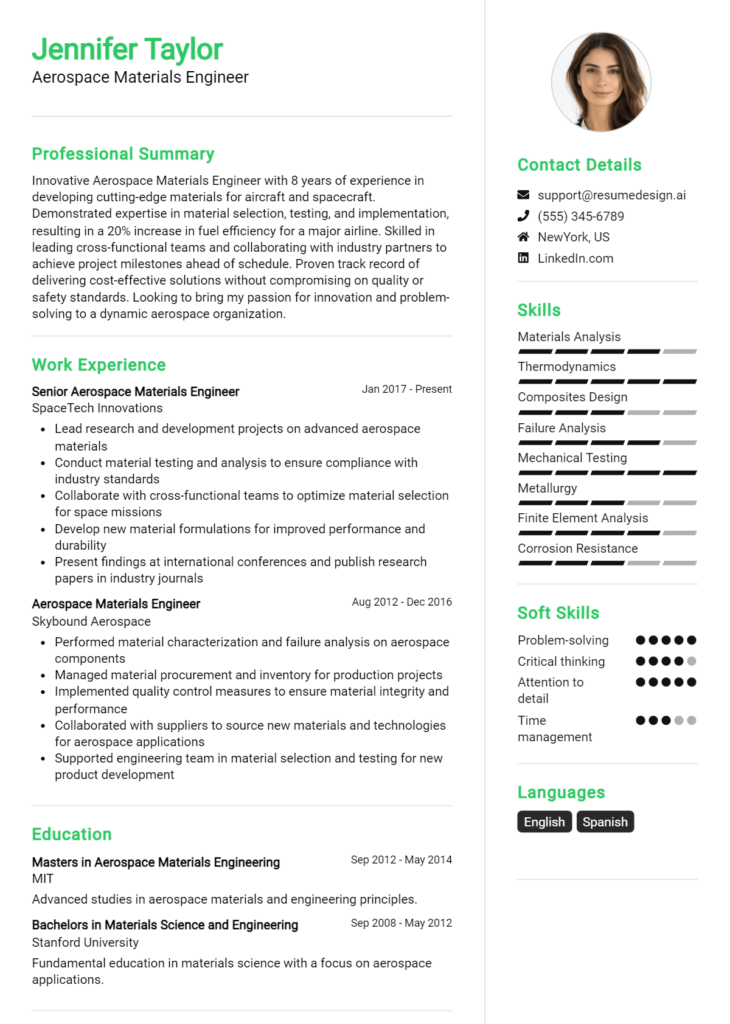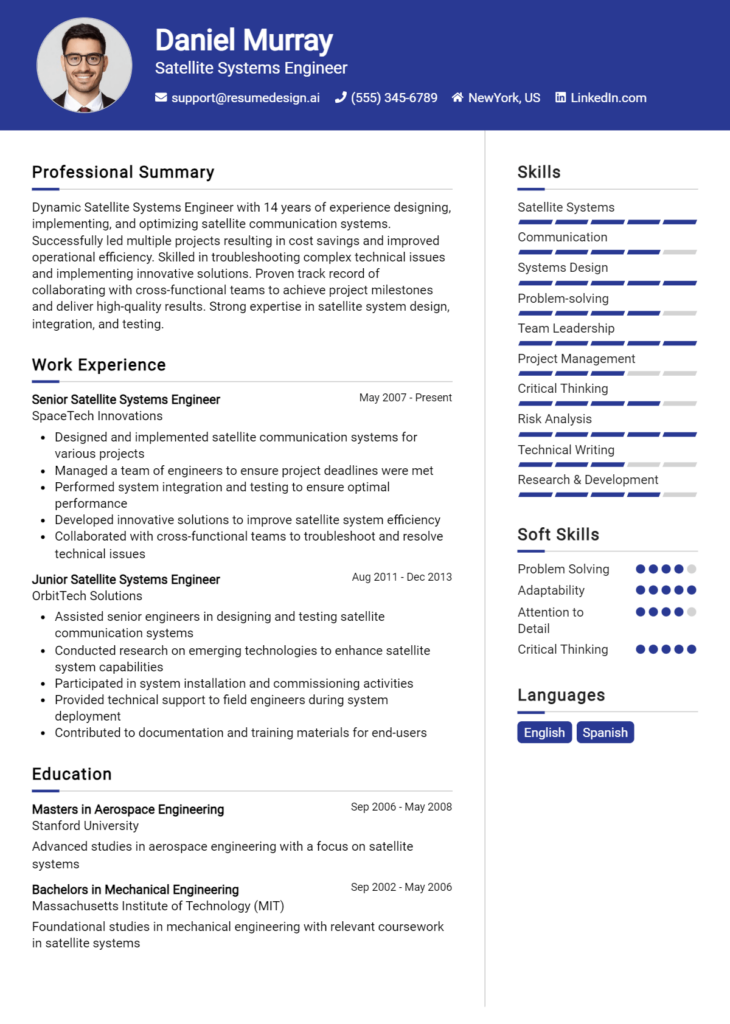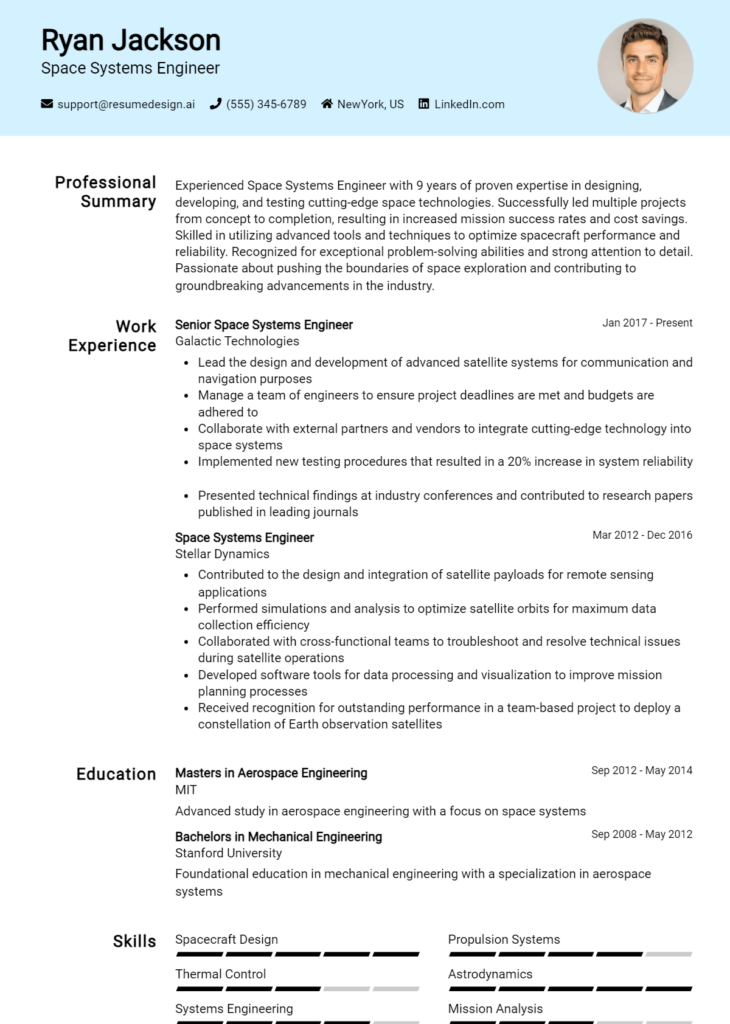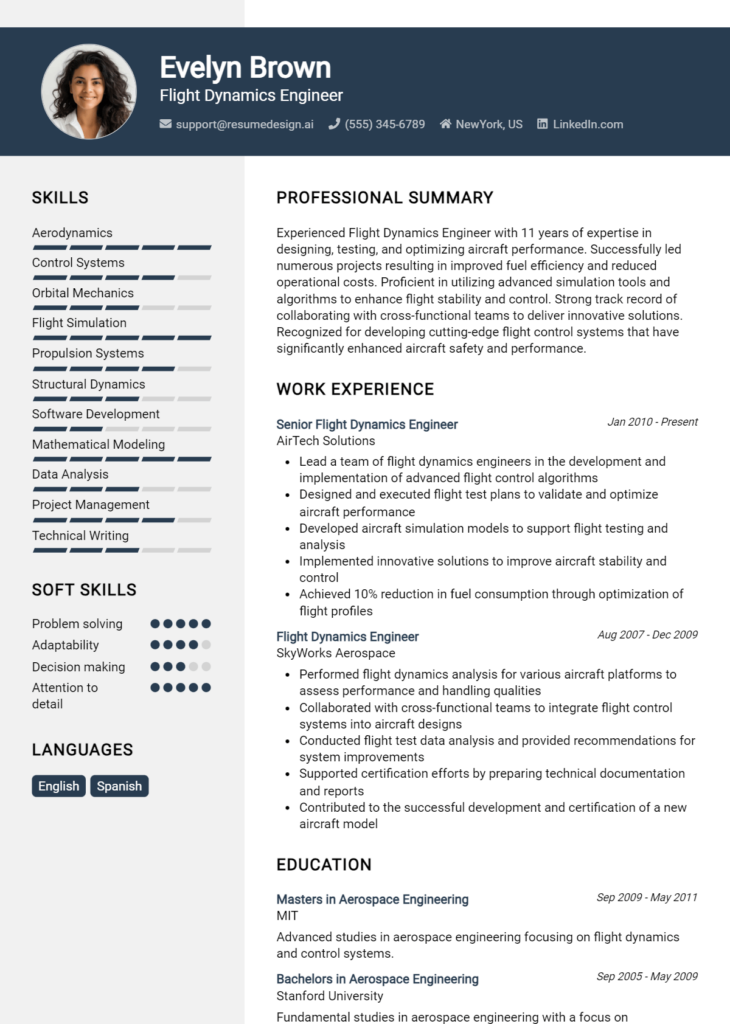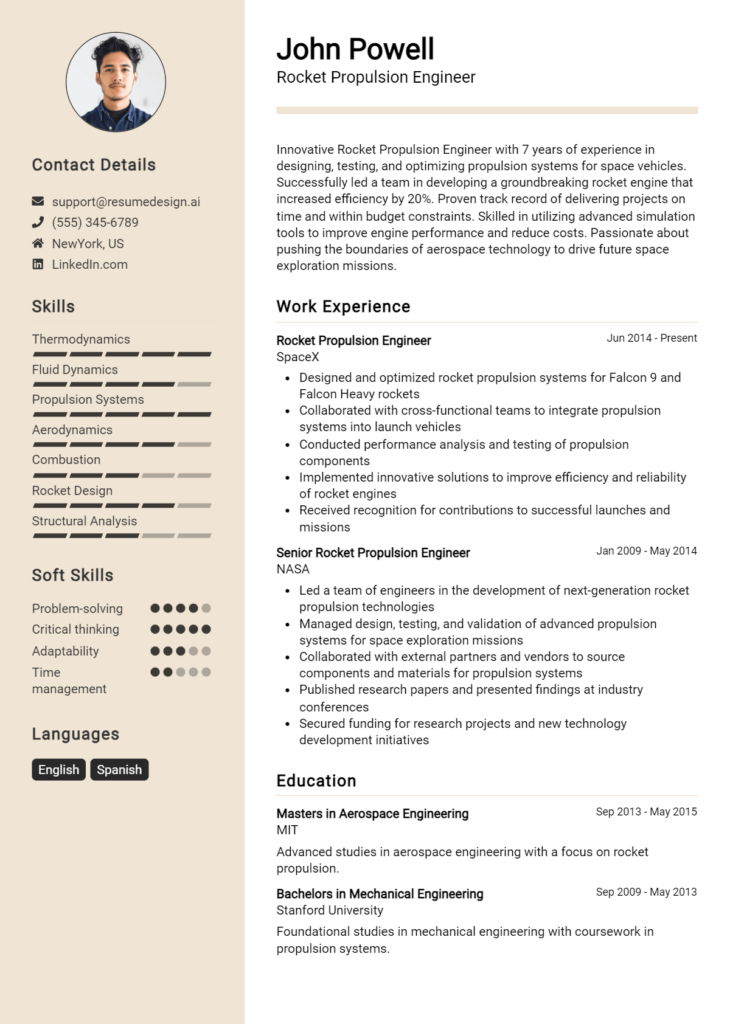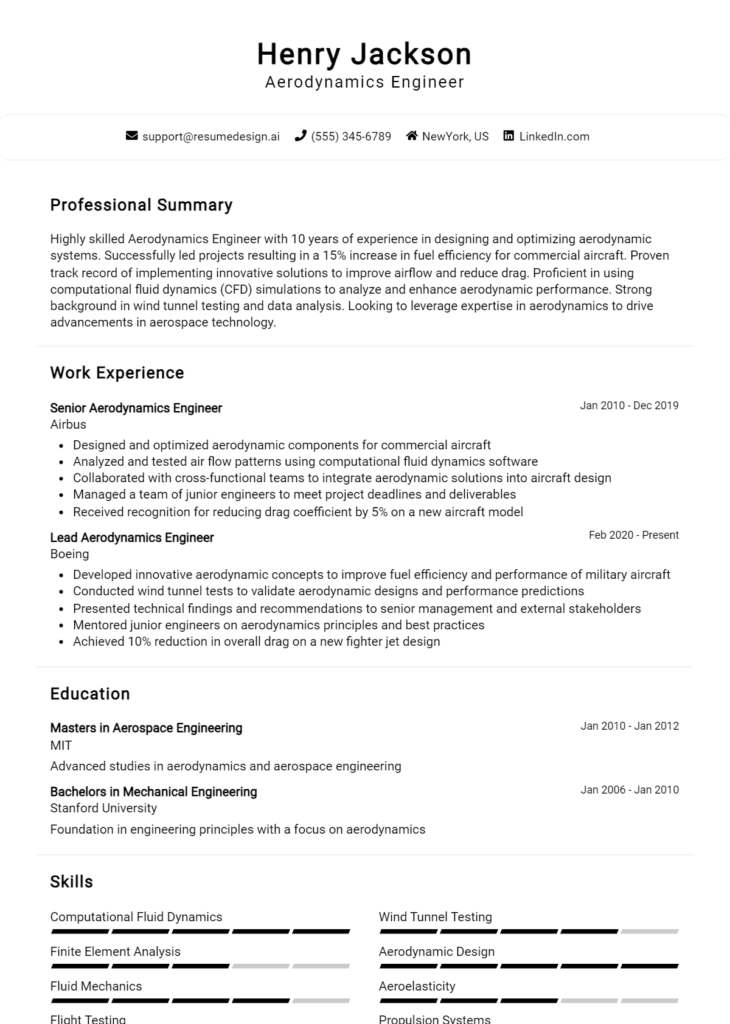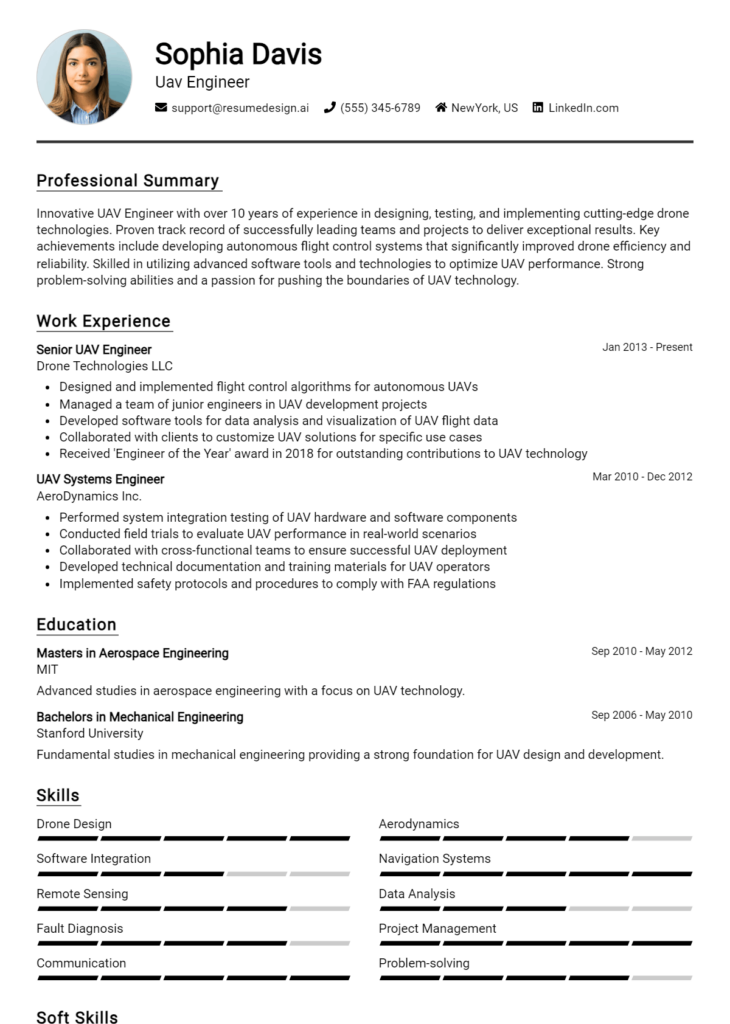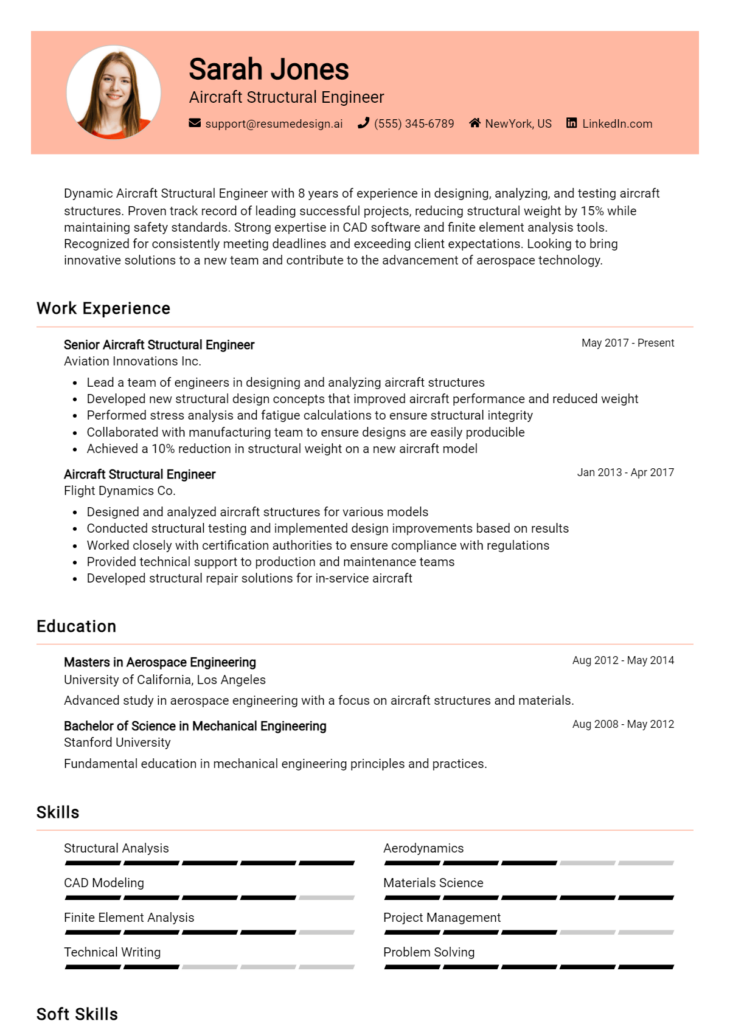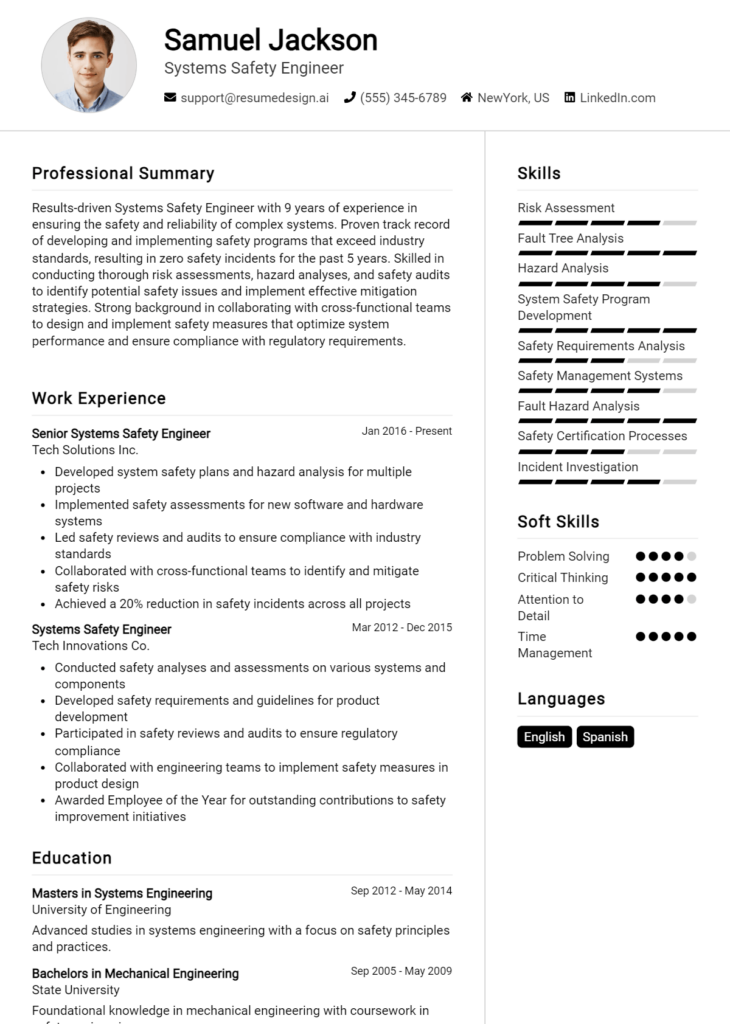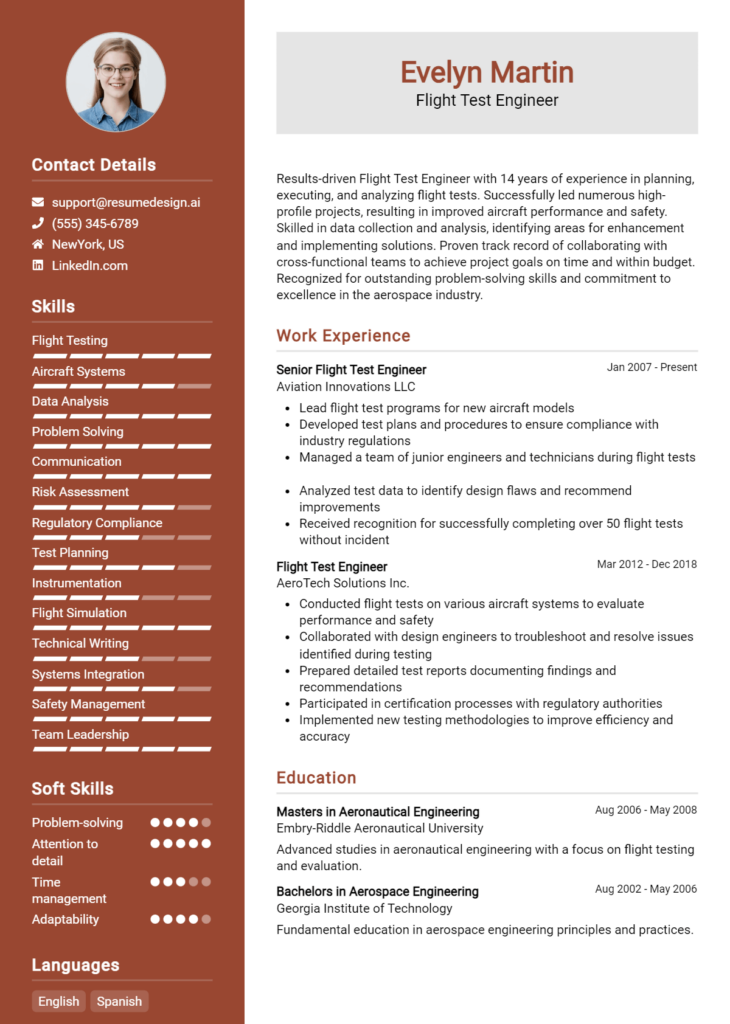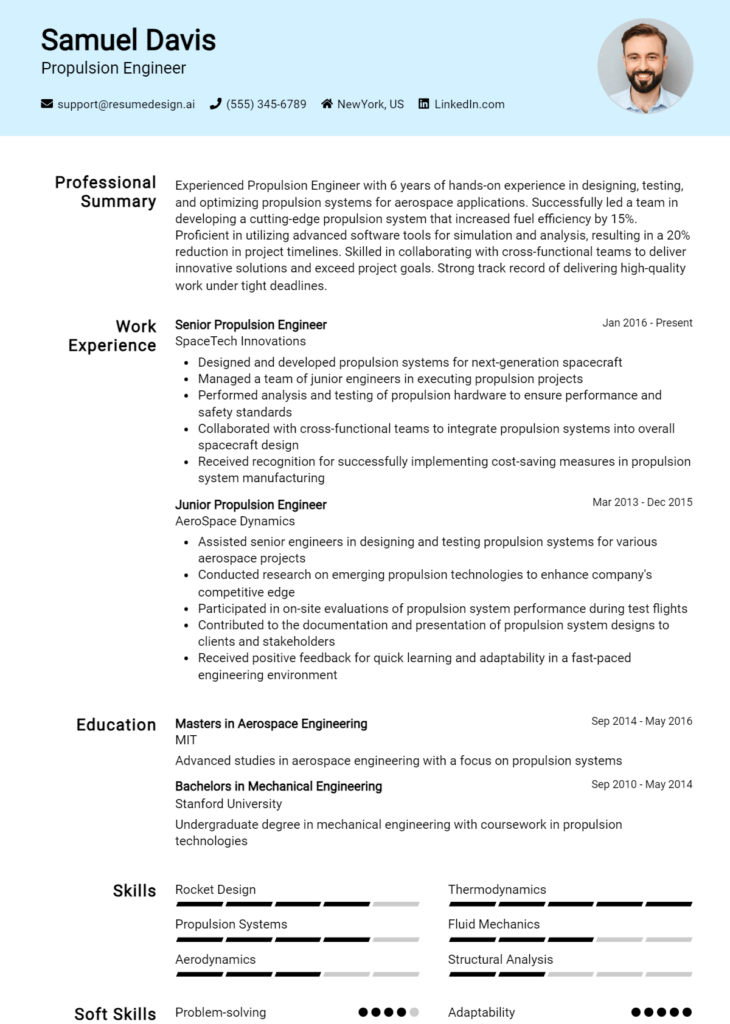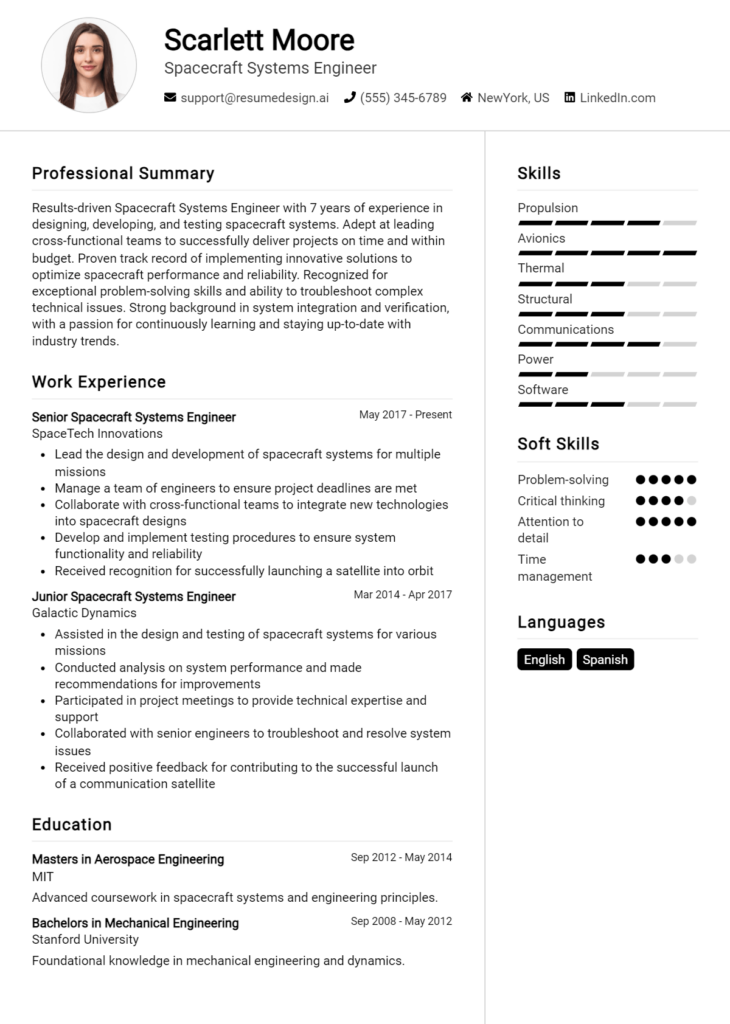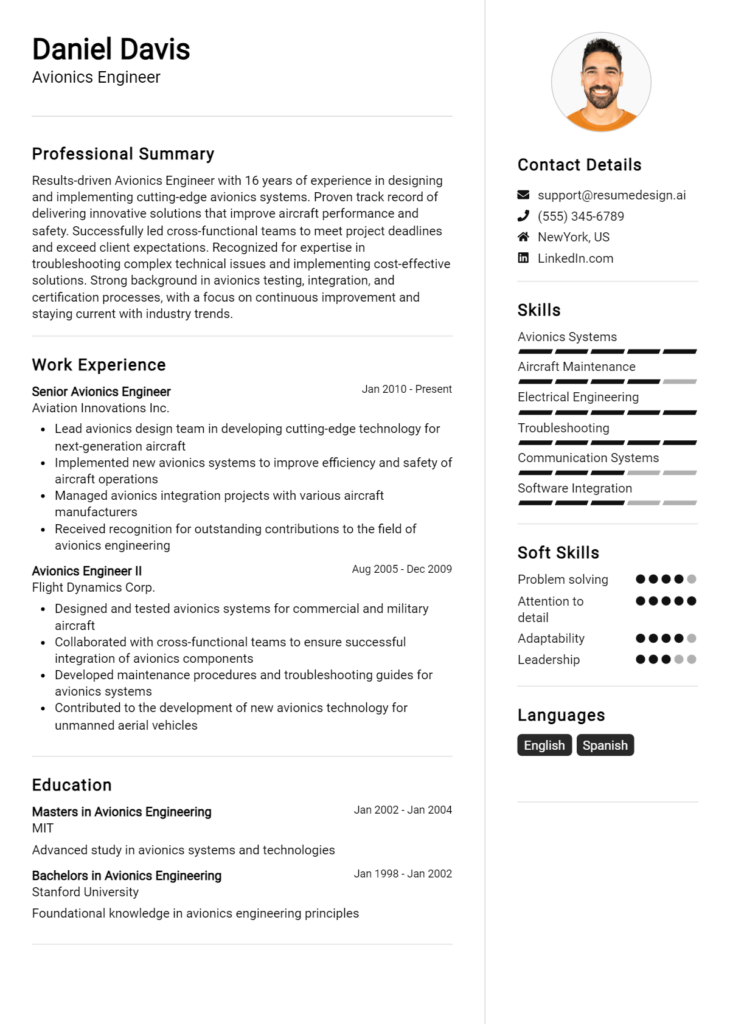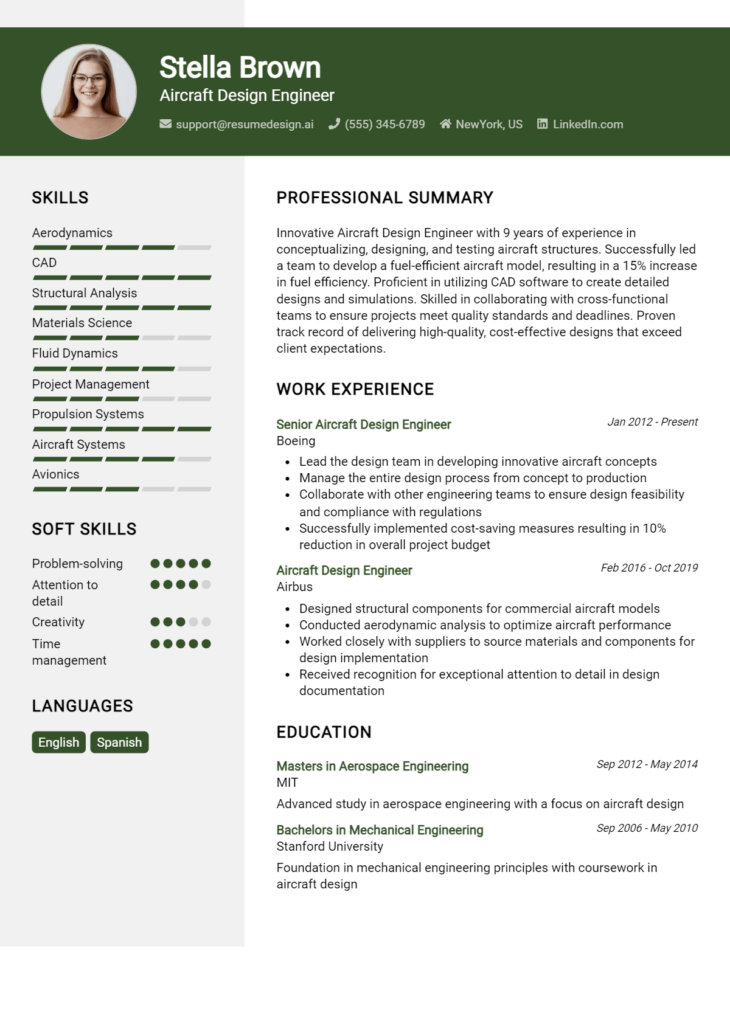Mission Systems Engineer Core Responsibilities
A Mission Systems Engineer plays a crucial role in coordinating and integrating various engineering disciplines to ensure successful mission outcomes. Key responsibilities include systems design, requirements analysis, and performance validation. This role demands strong technical skills, operational awareness, and exceptional problem-solving abilities to effectively bridge departments such as software, hardware, and systems engineering. A well-structured resume highlighting these competencies is essential, as it showcases the engineer’s ability to contribute to the organization's overarching goals through collaboration and innovation.
Common Responsibilities Listed on Mission Systems Engineer Resume
- Conduct system requirements analysis and verification.
- Design and implement mission-critical systems.
- Collaborate with cross-functional teams to ensure integration.
- Perform system testing and validation against specifications.
- Identify and mitigate risks throughout the project lifecycle.
- Develop technical documentation and reports.
- Provide technical support and training to stakeholders.
- Utilize modeling and simulation tools for system performance evaluation.
- Support system architecture design and trade studies.
- Participate in project planning and resource allocation.
- Engage in continuous improvement initiatives for system efficiency.
- Coordinate with suppliers and manufacturers for system components.
High-Level Resume Tips for Mission Systems Engineer Professionals
In today's competitive job market, a well-crafted resume is crucial for Mission Systems Engineer professionals looking to stand out to potential employers. Your resume serves as the first impression you make, often determining whether your application will proceed to the next stage. It should not only reflect your technical skills and expertise but also illustrate your achievements and contributions to previous projects. This guide will provide practical and actionable resume tips specifically tailored for Mission Systems Engineer professionals, ensuring that your resume effectively showcases your qualifications and sets you apart from the competition.
Top Resume Tips for Mission Systems Engineer Professionals
- Tailor your resume to each job description by incorporating relevant keywords and phrases that align with the specific requirements of the position.
- Highlight your experience in mission systems, emphasizing your roles in design, integration, and testing of complex systems.
- Quantify your achievements by including measurable outcomes, such as successful project completions, efficiency improvements, or cost reductions.
- Showcase industry-specific skills, such as proficiency in simulation software, modeling tools, and systems engineering methodologies.
- Include certifications and training relevant to mission systems engineering, such as INCOSE certifications or specialized technical training.
- Utilize a clear and organized format that enhances readability, making it easy for hiring managers to quickly identify key information.
- Incorporate a strong summary statement at the top of your resume that encapsulates your experience and career goals.
- Use action verbs to describe your contributions, emphasizing your proactive role in projects and initiatives.
- List any relevant publications or presentations, showcasing your thought leadership and engagement with the engineering community.
By implementing these tips, you can significantly enhance your chances of landing a position in the Mission Systems Engineer field. A targeted and well-structured resume that effectively communicates your skills and accomplishments will help you capture the attention of hiring managers and set you on the path to career success.
Why Resume Headlines & Titles are Important for Mission Systems Engineer
The role of a Mission Systems Engineer is pivotal in the design, integration, and management of complex systems that fulfill mission requirements, particularly in defense and aerospace sectors. Given the competitive nature of this field, a well-crafted resume headline or title serves as the candidate's first impression, acting as a powerful tool to grab the attention of hiring managers. A strong headline succinctly summarizes a candidate's key qualifications and areas of expertise in one impactful phrase, making it essential to ensure that it is concise, relevant, and directly related to the job being applied for. This initial hook can differentiate a candidate in a crowded job market, leading to further engagement with their resume.
Best Practices for Crafting Resume Headlines for Mission Systems Engineer
- Be concise: Aim for a headline that is no longer than a sentence or phrase.
- Use role-specific terminology: Incorporate industry jargon that is relevant to Mission Systems Engineering.
- Highlight key skills: Focus on the most valuable skills that align with the job description.
- Include quantifiable achievements: If possible, reference specific accomplishments or metrics.
- Tailor to the job: Customize your headline for each position you apply for to reflect the specific requirements.
- Use action-oriented language: Start with strong verbs to convey confidence and capability.
- Avoid clichés: Steer clear of overused phrases that do not add value.
- Be authentic: Ensure that the headline accurately represents your experience and skills.
Example Resume Headlines for Mission Systems Engineer
Strong Resume Headlines
Dynamic Mission Systems Engineer with 10+ Years in Aerospace Integration and Testing
Results-Driven Engineer Specializing in Advanced Systems Architecture and Development
Innovative Mission Systems Engineer with Proven Expertise in Cross-Functional Team Leadership
Experienced Systems Engineer with a Track Record of Successful Defense Program Implementations
Weak Resume Headlines
Engineer Looking for Opportunities
Experienced Professional in Engineering
Mission Systems Engineer Seeking New Challenges
Strong headlines are effective because they convey specific qualifications and achievements, making it easy for hiring managers to quickly assess a candidate's fit for the role. They capture attention and provide a clear snapshot of what the candidate brings to the table. In contrast, weak headlines fail to impress due to their vagueness and lack of specificity, leaving hiring managers with little motivation to delve deeper into the resume. A generic title does not reflect the unique strengths or experiences of the candidate, which diminishes the overall impact of the application.
Writing an Exceptional Mission Systems Engineer Resume Summary
A resume summary is a critical component for any Mission Systems Engineer seeking to make a strong impression on potential employers. This brief section serves as a powerful introduction, allowing candidates to quickly highlight their key skills, relevant experience, and noteworthy accomplishments. A well-crafted summary captures the attention of hiring managers, providing a concise yet impactful overview of the candidate's qualifications tailored specifically to the job they are applying for. In an industry where precision and technical expertise are paramount, having a compelling resume summary can set candidates apart in a competitive job market.
Best Practices for Writing a Mission Systems Engineer Resume Summary
- Quantify Achievements: Use numbers and metrics to showcase your impact in previous roles.
- Focus on Relevant Skills: Highlight technical skills and soft skills that are pertinent to the position.
- Tailor for the Job Description: Customize your summary to align with the specific requirements and keywords found in the job posting.
- Be Concise: Aim for 2-4 sentences that deliver maximum impact without unnecessary fluff.
- Use Action Verbs: Start sentences with strong action verbs to convey confidence and proactivity.
- Showcase Problem-Solving Abilities: Emphasize your experience in overcoming challenges and delivering solutions.
- Incorporate Industry Terminology: Use relevant jargon and terminology that resonate with hiring managers in the field.
- Reflect Your Professional Brand: Ensure your summary conveys your unique value proposition and professional identity.
Example Mission Systems Engineer Resume Summaries
Strong Resume Summaries
Dynamic Mission Systems Engineer with over 7 years of experience in designing and implementing advanced avionics systems. Led a project that increased system reliability by 30%, resulting in a $2 million cost savings over five years.
Detail-oriented engineering professional skilled in integrating multi-platform systems. Successfully managed a cross-functional team to deliver a complex satellite communication project 3 months ahead of schedule, improving operational efficiency by 25%.
Results-driven Mission Systems Engineer with expertise in software development and systems integration. Developed a new algorithm that enhanced data processing speed by 40%, significantly optimizing mission planning capabilities.
Weak Resume Summaries
Experienced engineer looking for a position in mission systems. I have worked on various projects and have many skills.
Dedicated professional with a background in engineering. I am seeking to contribute to a team in a mission systems role.
The strong resume summaries are considered effective because they include specific achievements, quantifiable outcomes, and relevant skills that directly connect to the Mission Systems Engineer role. They provide concrete evidence of the candidate's capabilities and successes, making them stand out to hiring managers. Conversely, the weak summaries are vague, lack detail, and do not demonstrate any measurable accomplishments or relevant skills, making them less likely to capture attention in a competitive job market.
Work Experience Section for Mission Systems Engineer Resume
The work experience section is a critical component of a Mission Systems Engineer's resume, as it serves as a showcase of the candidate's technical skills, leadership capabilities, and ability to deliver high-quality products in complex environments. This section illustrates not only the applicant's hands-on experience with systems engineering but also their proficiency in managing teams and collaborating across multidisciplinary groups. By quantifying achievements and aligning their experiences with industry standards and best practices, candidates can significantly enhance their appeal to potential employers.
Best Practices for Mission Systems Engineer Work Experience
- Begin each bullet point with action verbs to convey a sense of accomplishment.
- Quantify achievements by including metrics such as cost savings, efficiency improvements, or project timelines.
- Highlight specific technical skills and tools used in projects, such as modeling software or simulation techniques.
- Demonstrate collaboration by mentioning team sizes, cross-functional teams, or partnerships with stakeholders.
- Include details about the impact of your work on the overall project goals or objectives.
- Tailor your experience to match the job description and requirements of the position you are applying for.
- Use concise language and bullet points to improve readability and clarity.
- Showcase leadership roles or responsibilities that reflect your ability to guide teams towards successful outcomes.
Example Work Experiences for Mission Systems Engineer
Strong Experiences
- Led a cross-functional team of 10 engineers to design and implement a mission-critical communication system, resulting in a 30% reduction in system downtime.
- Managed the integration of advanced sensor technologies into existing platforms, enhancing data accuracy by 25% and reducing operational costs by $500,000 annually.
- Coordinated with software development teams to streamline the software development lifecycle, resulting in a 40% faster time-to-market for critical updates.
- Developed and executed system performance tests that improved reliability metrics by 15%, leading to increased customer satisfaction ratings.
Weak Experiences
- Worked on various projects related to mission systems.
- Assisted with team activities and contributed to project goals.
- Participated in meetings to discuss system requirements.
- Involved in troubleshooting issues within the engineering team.
The examples listed as strong experiences are considered effective because they provide specific, quantifiable outcomes that highlight the candidate's technical expertise and leadership qualities. They demonstrate tangible contributions to projects, showcasing collaboration and impact on overall objectives. In contrast, the weak experiences lack detail and specificity, presenting vague roles that do not clearly illustrate the candidate's skills or achievements, making it difficult for potential employers to assess their qualifications.
Education and Certifications Section for Mission Systems Engineer Resume
The education and certifications section of a Mission Systems Engineer resume is crucial as it showcases the candidate's academic foundation and commitment to professional growth in the field. This section serves to highlight relevant degrees, specialized certifications, and any ongoing education that reflects the candidate's dedication to staying current with industry standards and technological advancements. By including pertinent coursework and certifications, candidates can greatly enhance their credibility, demonstrating their preparedness and alignment with the specific requirements of the Mission Systems Engineer role.
Best Practices for Mission Systems Engineer Education and Certifications
- Focus on relevant degrees, such as Engineering, Computer Science, or Systems Engineering.
- Include industry-recognized certifications, such as Certified Systems Engineering Professional (CSEP) or Project Management Professional (PMP).
- Provide details on relevant coursework that demonstrates specialized knowledge applicable to mission systems.
- List continuing education or specialized training programs that reflect current trends and technologies in the field.
- Highlight advanced degrees (Master’s or PhD) when applicable, as they can set candidates apart.
- Ensure that all certifications are current and relevant to the specific job role being applied for.
- Use clear and concise language to describe educational achievements, focusing on key accomplishments.
- Organize the section in reverse chronological order to emphasize recent and relevant qualifications.
Example Education and Certifications for Mission Systems Engineer
Strong Examples
- B.S. in Aerospace Engineering, University of Michigan, 2020
- M.S. in Systems Engineering, Johns Hopkins University, 2022
- Certified Systems Engineering Professional (CSEP), INCOSE, 2023
- Relevant Coursework: Advanced Control Systems, Digital Signal Processing, Systems Architecture
Weak Examples
- B.A. in English Literature, State University, 2015
- Certification in Basic Computer Skills, 2018
- Diploma in Fashion Design, Community College, 2017
- Relevant Coursework: Introduction to Philosophy, Art History
The examples above illustrate a clear distinction between strong and weak qualifications. Strong examples showcase degrees and certifications directly related to systems engineering and aerospace, emphasizing the candidate's relevant knowledge and skills. In contrast, weak examples reflect irrelevant educational backgrounds and certifications that do not align with the Mission Systems Engineer role, which could undermine the candidate's suitability for the position.
Top Skills & Keywords for Mission Systems Engineer Resume
A well-crafted resume for a Mission Systems Engineer is critical in showcasing not only technical expertise but also essential soft skills that contribute to successful project execution and collaboration. Employers seek candidates who can seamlessly integrate complex systems while also communicating effectively with diverse teams. Highlighting relevant skills is crucial, as it allows potential employers to assess your suitability for the role at a glance. By emphasizing both hard and soft skills, you can paint a comprehensive picture of your capabilities, ultimately enhancing your chances of securing an interview.
Top Hard & Soft Skills for Mission Systems Engineer
Soft Skills
- Communication
- Team Collaboration
- Problem-Solving
- Critical Thinking
- Adaptability
- Leadership
- Time Management
- Attention to Detail
- Analytical Thinking
- Creative Thinking
- Conflict Resolution
- Decision Making
- Emotional Intelligence
- Negotiation Skills
Hard Skills
- Systems Engineering Principles
- Requirements Analysis
- Model-Based Systems Engineering (MBSE)
- Software Development Lifecycle (SDLC)
- Simulation and Modeling Tools
- Systems Integration
- Test and Evaluation Processes
- Aerospace Standards and Regulations
- Programming Languages (e.g., Python, C++)
- Software Documentation
- Risk Management
- Configuration Management
- Data Analysis and Management
- Hardware and Software Integration
- Network Architecture
- Cybersecurity Principles
Leveraging the right skills in your resume, alongside detailing your work experience, can dramatically improve your appeal to employers in the field of Mission Systems Engineering.
Stand Out with a Winning Mission Systems Engineer Cover Letter
I am excited to apply for the Mission Systems Engineer position at [Company Name], as advertised on [Where You Found the Job Posting]. With a solid background in systems engineering and extensive experience in developing mission-critical systems for defense and aerospace applications, I am confident in my ability to contribute effectively to your team. My passion for innovative technology and commitment to excellence aligns perfectly with [Company Name]'s mission to deliver cutting-edge solutions.
In my previous role at [Previous Company Name], I successfully led a team in the design and implementation of a sophisticated mission planning system that enhanced operational efficiency and reduced mission planning time by 30%. I leveraged my expertise in systems architecture, requirements analysis, and integration testing to ensure that all components met rigorous performance standards. My collaborative approach allowed me to work closely with cross-functional teams, including software developers and field operators, to ensure that our solutions were not only technically sound but also user-friendly and adaptable to dynamic operational environments.
I am particularly drawn to this position at [Company Name] due to your commitment to innovation and excellence in mission systems engineering. I am eager to bring my analytical skills and problem-solving abilities to your projects and contribute to the development of systems that support critical missions. I am also enthusiastic about the opportunity to work in an environment that fosters collaboration and continuous improvement, as I believe that the best solutions often arise from diverse perspectives and teamwork.
Thank you for considering my application. I look forward to the opportunity to discuss how my skills and experiences align with the goals of [Company Name]. I am excited about the possibility of contributing to your mission and helping to shape the future of mission systems engineering. Please feel free to contact me at [Your Phone Number] or [Your Email] to arrange a discussion.
Common Mistakes to Avoid in a Mission Systems Engineer Resume
When crafting a resume for a Mission Systems Engineer position, it's crucial to present your skills and experiences effectively. However, many candidates fall into common pitfalls that can undermine their chances of making a strong impression. Avoiding these mistakes can significantly enhance the quality of your resume, ensuring that it highlights your qualifications in a way that resonates with hiring managers.
Lack of Specificity: Failing to provide detailed descriptions of your past projects and responsibilities can leave employers unsure of your capabilities. Clearly outline your role and contributions in each project.
Generic Objective Statements: Using a vague or overly generic objective statement can detract from your resume. Tailor your objective to the specific position you are applying for, showcasing your enthusiasm and fit for the role.
Neglecting Relevant Keywords: Many companies use Applicant Tracking Systems (ATS) to filter resumes. Not including relevant keywords from the job description may result in your resume being overlooked. Be sure to incorporate specific industry terms and technologies.
Inconsistent Formatting: An unprofessional or inconsistent format can make your resume difficult to read. Use a clean, uniform layout with consistent font sizes, bullet points, and headings to enhance readability.
Overloading with Technical Jargon: While technical skills are essential, using excessive jargon can alienate some readers, especially non-technical HR personnel. Strike a balance by explaining complex concepts in a way that is accessible.
Ignoring Soft Skills: Focusing solely on technical skills can lead to an incomplete picture of your qualifications. Highlight key soft skills, such as teamwork, communication, and problem-solving, which are critical in collaborative mission environments.
Omitting Quantifiable Achievements: Failing to include measurable outcomes from your work can weaken your impact. Whenever possible, quantify your accomplishments (e.g., "improved system efficiency by 20%") to provide concrete evidence of your success.
Not Tailoring for Each Application: Sending out the same resume for every position can be detrimental. Tailor your resume for each application to reflect the specific skills and experiences that align with the job requirements.
Conclusion
As a Mission Systems Engineer, you play a crucial role in the development and integration of complex systems for aerospace and defense applications. Your expertise in systems engineering principles, along with your ability to collaborate across multidisciplinary teams, ensures that mission objectives are met efficiently and effectively. You are responsible for defining system requirements, conducting trade studies, and leading verification and validation processes to ensure system integrity and performance.
In this competitive field, having a standout resume is essential to showcase your technical skills, project experience, and problem-solving abilities. Highlight your proficiency in systems modeling, simulation, and analysis, as well as any relevant certifications that enhance your qualifications. Remember to tailor your resume to reflect the specific demands of the Mission Systems Engineer role you are pursuing.
Now is the perfect time to review and refine your Mission Systems Engineer resume. Make sure it aligns with industry standards and effectively communicates your strengths. To help you in this process, consider utilizing valuable resources such as resume templates, a resume builder, resume examples, and cover letter templates. These tools can provide you with the guidance and inspiration needed to craft a compelling resume that will capture the attention of hiring managers. Take action today and ensure your resume reflects the exceptional capabilities you bring to the table as a Mission Systems Engineer!

